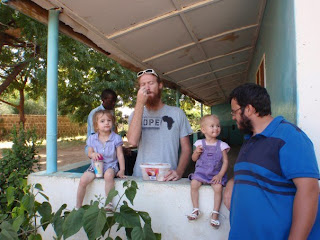
The STEM team that came over Thanksgiving was our first clue that we had learned a lot more about this place than we might have thought that we had.
At the same time that the new team arrived, though, just under two weeks ago, -- actually, on the same bus that they came on -- we had a short term team of doctors from the States and translators from a church in Nairobi come up to do some medical clinics, and we realized then just how comfortable and familiar this place has become.

It was strange to ride out to the bush in a van full of Kenyans, pointing out to them different types of trees and wildlife that, even though this is their country, they had never seen before. And, it was strange to realize that, although they had a better chance at blending into the crowd (ish), we were the ones who were more comfortable with the situation and more familiar with the culture.

It was strange to listen to the American doctors diagnose and realize how my thinking has changed and how it seems natural now to start with the tropical ("exotic") diseases and only move on to things like colds and influenza after other things have been ruled out -- as opposed to the doctors, who looked at (seemingly) every other cause before considering malaria.
This morning, we helped to chaperon the boarders at a local primary school on a visit to the children's wing of the general hospital, and it was strange to be the one trying to encourage the kids to talk, be the one taking them by the hand or the shoulder and helping them to introduce themselves to the mamas and babies in the room that they were visiting.
The strangest part, though, is that none of the situations felt strange in the moment.
**"Wazee" is a Kiswahili word for old people or elders. We use it as a sort of a joking method or differentiating between the "old" team and the new team. When we got here, the team before us were the "wazee." Now, we're the old ones.**






























